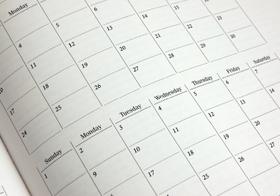I have interviewed hundreds of job applicants over the years. I can assure you that a job interview will contain all kinds of traps. Sometimes the interviewer sets the traps. She will build questions into her interview script so she can see how you handle unexpected situations. Other times you will unknowingly set a trap for yourself by making a statement which the interviewer determines is worth exploring in greater detail. Against that backdrop, let's review how to handle some of those traps which might occur when you interview for that job as the math teacher at St. Agatha's Academy.
1. Do some role-playing.
Preparing for a job interview is an essential part of the process if you truly want the job. That's because the competition is a lot tougher these days. Public schools and colleges and universities have been down-sizing their teaching staffs. There are many reasons for this, but the bottom line is that more qualified education professionals are applying for teaching jobs than ever before.
How should you prepare for your interview? A few weeks before your interview do some role-playing, enlist the aid of a trusted friend or family member to play the part of the interviewer. Dress up in your interview outfit. Do the role-playing in a setting similar to what you might expect for the interview, such as an office or a table in Starbucks. The 16th-century adage that 'practice makes perfect' applies to your job interview. You will be amazed at the imperfections and glitches which a little role-playing will expose.
2. Prepare a clear, concise resume.
Chances are that you applied for the position online. That's fine. However, you should update your resume and customize it for the position for which you will be interviewed. Print out three copies on white 20 lb. copy paper and bring them with you to the interview. Again, enlist the eyes and opinion of a trusted friend to review your resume for clarity and conciseness. A poorly prepared resume can confuse and mislead the interviewer. Think of your resume as your reflection in a mirror. Make sure it reflects a superb image. Always use a standard business font such as Arial and print your resume using black ink and white copy paper. Make sure there are no typos.
This video explains how to write an effective video.
3. Dress for success.
Before you show up for your interview, scan the photos of the faculty on the school's website. Then dress in a similar fashion. In other words, dress for your interview the way their teachers do, i.e., as though you already have the job. If the interviewer can imagine your fitting into her community, that is a huge plus. You will never go wrong dressing semi-formally. For men, that means a solid color dark jacket, white or blue shirt, dark color slacks and a tie. For women, a pants suit or jacket and skirt are appropriate. If you have piercings and tattoos, you might want to remove the metal and cover the artwork, at least until you can gauge the level of acceptance, and, more importantly, until you have the signed contract in your hand. In some school settings, the piercings and artwork will not be a deal-breaker. In others, they will. Once again have your trusted friend, preferably an older friend, have a look at you in your job interview garb. Her comments will probably be instructive and helpful. What To Wear At Your Job Interview offers more suggestions.
4. Relax.
Of course, you are nervous. Who wouldn't be? After all, you have a lot riding on this interview. Moreover, you know that there has been much competition for the position. However, remember that you are a teacher. You have been professionally trained to assess people. You have years of experience looking for signals and responding to cues in the classroom. The same conditions apply in the interview situation. So, just relax, keep your antennae working and you will do fine. Don't be intimidated by the setting or the interviewer. Be yourself.
5. Anticipate the tough questions.
If you were fired from your last job or left it under unhappy circumstances, then deal with that honestly when the issue is raised. You can be assured that it will come up. Similarly, compensation can be difficult to discuss. However, it makes sense to explain your requirements in a straightforward, calm manner. Research what teachers are paid in your market area as, obviously, it makes no sense to expect compensation which is significantly out of line with what other teachers earn locally. Find the salary scales for local public school teachers. Private school teachers are usually paid about 10% less. As long as you are in the ballpark, you will be ok.
Graham Martin discusses handling tough questions in your job interview in the following video.
Staying cool when the interviewer asks tough questions speaks to your experience and ability to control your classes. Students always lob questions out of left field without much warning. The school needs to know that you will not be intimidated or thrown off by unexpected questions.
As always, it pays to play offense. Point out anything unusual in your job history before the interviewer gets to it. A simple explanation may be all that is required. Remember that the school will speak with your previous employer when you are offered the job. Explain any issues unemotionally and truthfully. There is no harm in stating that there was a change in department heads and that you felt it was time to move on. Most interviewers will understand that reason.
Some final words of advice: being cool under fire is something every head of school or department head appreciates and values. A classroom is full of little traps and surprises. You know how to handle those. Your job interview is no different. Show the school that you bring value to their community. Your enthusiasm for teaching your subject and your sterling credentials will be attributes which the school will happily discuss with prospective parents. While facilities and programs matter to us parents, the quality of teaching trumps most other considerations.
Questions? Contact us on Twitter. @privateschoolreview






















